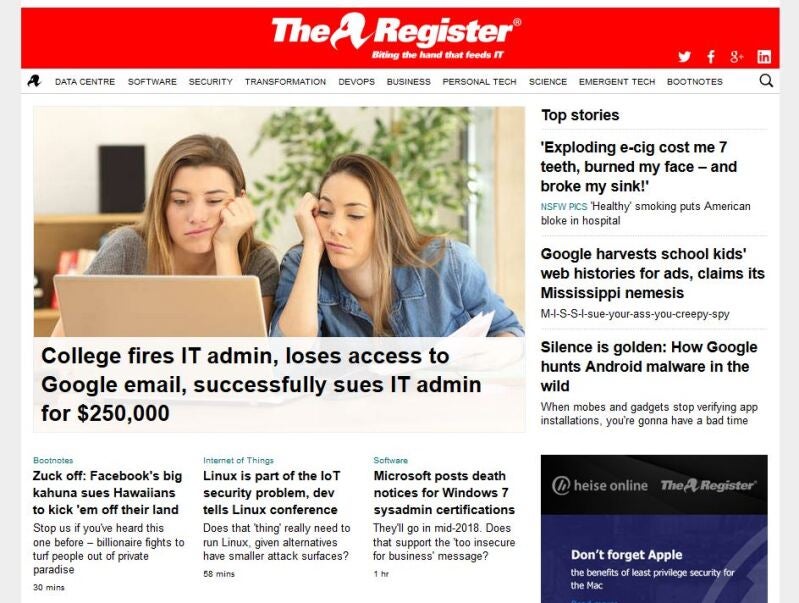
The relationship of many news publishers with Google and Facebook is like the frog in boiling water that doesn’t jump out until it is too late, according to a leading technology publisher.
Drew Cullen (pictured below) is joint owner, founder and editor in chief of The Register, a London-based independent technology website which launched 20 years ago and now employs 22 journalists based in three countries.
With the slogan under its masthead “Biting the hand that feeds IT” it prides itself on taking an irreverent approach to the industry which, according to Cullen, makes it something of a rarity in the IT journalism niche.
Talking to Press Gazette’s Journalism Matters podcast he said: “In America particularly they play the access game with journalists. If you don’t follow suit it is ‘what’s wrong with you?’ They like predictability.
“The publications value access an awful lot and mostly will play ball. We have this grotesque situation where large swathes of the tech press and general press are fawning over these gigantic Silicon Valley firms who are led by people on the spectrum who have no social responsibility and have infected the body politic.”

Drew Cullen
Asked for his thoughts about the effect Google and Facebook in particularly have had on the journalism industry, he says: “Google destroyed the local press many years ago. The first that went was classified advertising. Facebook has been more insidious.
“It’s like the frog in hot water. It’s there until it’s boiling and it’s too late. It’s been perfectly obvious the existential threat that Google and Facebook have delivered to publications for many years yet what do they do? ‘Oh we’re on Google News we’ve got a good ranking’, ‘oh we’re on Facebook instant articles’. It’s like what Lenin used to say about the Labour Party – useful idiots.”
He adds: “If you’re a general newspaper you’re competing against the might of Google and Facebook, they’re taking away your readers, they’re exploiting your content and they’re messing with your advertising as well. You’re hit from all sides.”
Talking about the current pressures on digital advertising, Cullen quotes Guardian research which found that for every pound an advertiser spends on programmatic advertising (ads which are supplied via networks) only 30 per cent goes to the publisher.
He says: “Most of the ad-tech companies are charlatans. They are taking out vast amounts of money that should go to the publishers. It’s a bad deal for the publishers and the vendors.
“The notion of the internet was there would be disintermediation. There’s more intermediaries then ever. The number of middlemen is more than you’d have in Saudi Arabia trying to sell arms.”

The Register has tackled these pressures by moving away from display advertising into events and “lead generation” (selling data about readers to those who want to sell things to them). Parent company, Situation Publishing, also runs a new website called The Next Platform all about super computers which is able to charge a high premium for its display advertising.
Cullen says that last year Situation Publishing turned over £6.5m and this year it is on track to make £8m with the revenue split between display advertising (one third), lead generation (one third) and the rest coming from events and native advertising.
Talking about the editorial approach of The Register, he says: “One the big mistakes of B2B owners is that B2B equals boring, and supine to the vendors. In some small niches they have no other choice, it’s that or die. Our core focus is if we get it right for reader the advertisers will follow.”
Does that get The Register in trouble with advertisers?
“We have been blacklisted by advertisers. We are blacklisted by two large companies right now. Most advertisers are clever enough to just say ‘we’re not interested’, rather than let you know this.
“Its always nice to get money from people, but if you change what you write because of advertising pressure you lose the heart of your publication and you lose your readers.”

The Register is one of the few B2B publications to speak out about the concerns it has over Section of the Crime and Courts Act. After a consultation, the Government is currently mulling whether to enact the legislation which would impose libel and privacy cost penalties on publishers who aren’t part of a Royal Charter-backed press regulator.
Cullen says: “We’re very careful. We’ve had loads of legal letters over the years. We’ve actually gone to court once. Within the existing legal framework we’ve been able to play the game.
“Section 40 changes the game completely in terms of the risk it places on publishers. We’ve had reputation management consultants ring us up asking to have stories removed, we’ve had letters…we can deal with that.
“If someone comes in and says you have to go to arbitration. If you don’t do this we’re going to sue you. That will be a weapon for reputation management consultants. Section 40 is an instrument for the rich and powerful it is being sold as something for the poor and meek, it is no so thing.”
According to Cullen The Register currently attracts 4m to 5m readers per month.
He says: “We have had more. There’s that saying get big, get niche or get out.
“We went through a period for a few years of chasing traffic. The guy did it very successfully for a while but it wasn’t commercially successful. It wasn’t really sustainable in the long term.
“When we first started we had very little competition into the UK. We were a journal of record. We would write lots of stories they were often quite shallow. There’s no point in doing that any more. “Our journalists’ output in story numbers is a lot lower than it used to be. On the other hand we expect them to be of higher quality.”
Listen to this interview in full on the Press Gazette – Journalism Matters podcast.
Email pged@pressgazette.co.uk to point out mistakes, provide story tips or send in a letter for publication on our "Letters Page" blog







